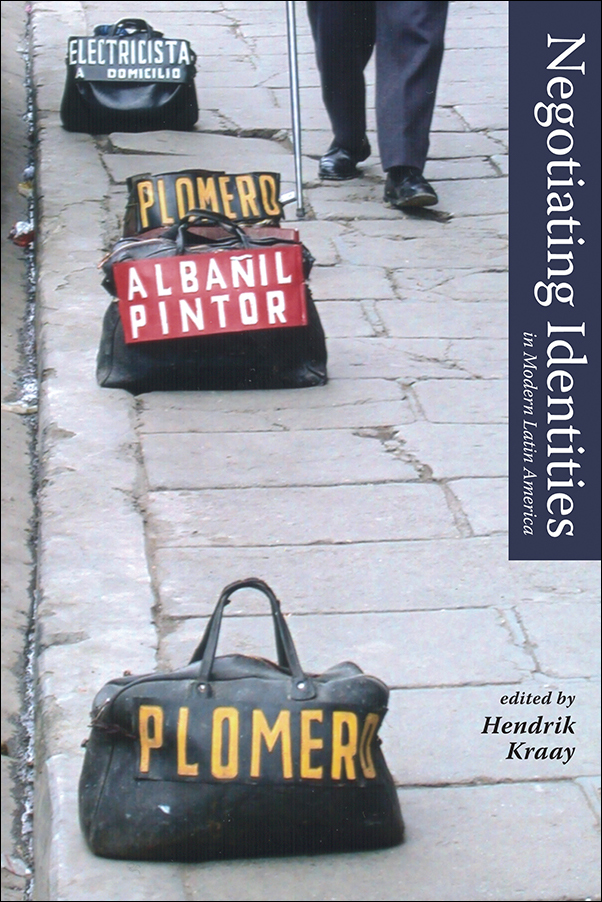
Negotiating Identities in Modern Latin America
Edited by Hendrik Kraay
$39.95 CAD / $39.95 USD
296 pages
6 x 9 inches
Paperback: 978-1-55238-229-5
Library PDF: 978-1-55238-414-5
September 2007
How do people define their collective identities? What are the uses and meanings of identities, and how can historians and anthropologists research such intangible topics? How can the study of identities contribute to the study of complex societies, and of the individuals within them?
Negotiating Identities in Modern Latin America explores some of the ways in which people define their membership in groups and their collective identity, as well as some of the challenges to the definition and maintenance of that identity. This interdisciplinary collection of essays, addressing such diverse topics as the history of Brazilian football and the concept of masculinity in the Mexican army, provides new insights into questions of identity in nineteenth- and twentieth-century Latin America.
The essays cover a wide range of countries in the region, from Mexico to Argentina, and analyze a variety of identity-bearing groups, from small-scale communities to nations. Hendrik Kraay has gathered contributions from historians and anthropologists. Their individual methodological and theoretical approaches combine to paint a picture of Latin American society that is both complex and compelling. The chapters focus on the day-to-day construction of identity among ordinary people, from American nationals living in Peru to indigenous communities in Argentina.
With Contributions By: Hendrik Kraay, Stephen Neufeld, Gregg P. Bocketti, Louise H. Guenther, Ronald N. Harpelle, María Eugenia Brockmann Dannenmaier, Maria Cecília Velasco e Cruz, Jennifer J. Manthei, Denise Fay Brown, Marjorie M. Snipes, and Julie Gibbings
Hendrik Kraay is a professor and head of the Department of History at the University of Calgary. He is the author of Race, State, and Armed Forces in Independence-Era Brazil: Bahia, 1790s-1840s and has edited several other scholarly volumes.
Illustrations
Tables
Preface
Introduction: Negotiating Identities in Modern Latin America
Hendrik Kraay
Part I: Defining Nations
"Let Us Be Brazilians on the Day of Our Nationality:" Independence Celebrations in Rio De Janeiro, 1840s-1860s
Hendrik Kraay
Performing the Masculine Nation: Soldiers of the Mexican Army, 1976-1910
Stephen Neufeld
Playing with National Identity: Brazil in International Football, 1900-1925
Gregg P. Bocketti
Part II: Foreigners in Latin America
Merchants, Abolitionists, and Slave Traders: Brazilian Perceptions of the British in Bahia, 1808-1850
Louise H. Guenther
Cooking Class; Order and the Other in the Corporate Kitchens of Latin America
Ronald N. Harpelle
(Re)turning Home: Narratives of Bolivian Transnational Migrants
Maria Eugenia Brockmann Dannemaier
Part III: Race and Identity in Brazil
Race, Ethnicity, and Class in Rio de Janeiro’s Port: The Coffee and Warehouse Workers Resistance Society.1905-1909
Maria Cecilia Velasco e Cruz
The Brazilian Mulata: A Wood for All Works
Jennifer J. Manthei
Part IV: Community Identities
The Cah: Place and the Identity of Chemax Maya
Denise Fay Brown
Creating Identity out of Place: An Indigenous Community in Argentina
Denise Fay Brown
Becoming Nature’s Defenders: Fashionable Identities and Subversive Community in the Mayan Biosphere Reserve, Guatemala
Julie Gibbings
Contributors
Index
This collection encourages us to reflect upon the uses and meanings of identity and the methodologies and research questions historians and anthropologists might employ to get at such an intangible topic. All the more admirable, since, though the state seems present in each chapter (even when just in the background), it is the quotidian identity that most of these works seem to unveil
—Cynthia E. Milton, University of Toronto Quarterly